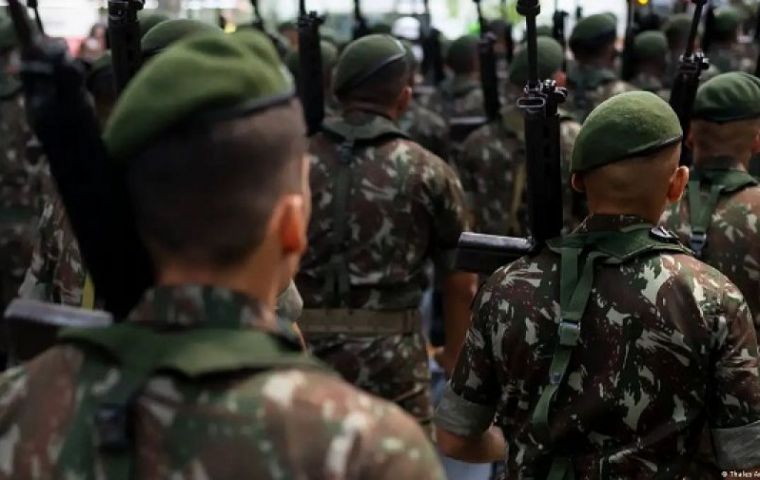MercoPress. South Atlantic News Agency
Brazil deploys Armed Forces to control airports and other key sites
 Lula does not want the military inside the favelas
Lula does not want the military inside the favelas Brazilian President Luiz Inácio Lula da Silva ordered the militarization of South America's largest country's main ports and airports amid growing violence among drug gangs and vigilante militias, it was reported.
Lula announced Wednesday that the Armed Forces were to be deployed to reinforce security at ports and airports in the states of Rio de Janeiro and São Paulo, in operations of arrests and confiscation of assets belonging to drug traffickers. ”The Law and Order Guarantee Decree (the legal instrument that allows the mobilization of the military) will be restricted to the port of Rio de Janeiro, Santos, and Itaguaí, in addition to the airports of Galeão (Rio) and Guarulhos (Sao Paulo),“ said Lula.
He also underlined that the military's work would be carried out in coordination with the Federal Police. According to the Justice Ministry, some 3,700 troops would be deployed: 2,000 from the Army, 1,100 from the Navy, and 600 from the Air Force. In addition, the Federal Police will expand intelligence actions and operations of arrests and confiscation of assets belonging to drug trafficking factions and militias, especially in Rio de Janeiro.
The Army and the Air Force will ”immediately” strengthen actions on Brazil's borders, especially in the states of Paraná (south) and Maro Grosso and Mato Grosso do Sul (southwest), it was also explained, while the Navy will reinforce security in the bays of Guanabara and Sepetiba (Rio), the port of Santos (Sao Paulo), and Itaipu Lake (Paraná).
Coordinating these actions will be a committee to be created featuring Ministers Flávio Dino (Justice and Public Security) and José Mucio (Defense).
Involving the military to reinforce security in Rio de Janeiro has already been discussed in the last few days, although Lula did not want the Armed Forces to patrol the streets or penetrate the favelas in operations against drug trafficking. In the end, it was decided to place the military at borders, ports, and airports to guard the routes through which drugs enter and leave.
Meanwhile, Brazilian authorities are carrying out an operation to repatriate 32 nationals from the West Bank, the Foreign Ministry said in a statement. The document mentioned 12 men, 9 women, and 11 children.
According to Ambassador Alessandro Candeas, three vehicles, including buses and vans rented by the Brazilian representation, transported these people from 11 West Bank villages to the city of Jericho. “The vehicles were labeled with the Brazilian flag. For security reasons, the license plates, routes, and passenger lists were communicated to Palestinian and Israeli authorities,” Candeas explained.
In the Gaza Strip, 34 other Brazilians are still waiting for authorization to cross the border to Egypt. The border was opened for the first time on Wednesday since the beginning of the conflict to allow the departure of wounded Palestinians and a group of around 450 foreigners.




Top Comments
Disclaimer & comment rules-

-

Read all commentsNice ! This way the airports used by the well heeled will remain safe, but the bus stations frequented by the hoi polloi continue to be dicey territory. This law and order posturing is unlikely to have a meaningful impact on the safety crisis for the average Brazilian citizen; an item that is a primary obligation of government, but sadly neglected and perverted for many decades.
Nov 02nd, 2023 - 12:38 pm 0The objective of this measure is to financially suffocate organized crime whose revenues are linked to international drug trafficking and firearms smuggling.
Nov 02nd, 2023 - 01:10 pm 0Suitcases and containers that travel through our ports and airports are opened by the customs authority when there is evidence of illicit activity or by sampling. It is necessary to significantly increase the number of public servants able to investigate any and all air or port cargo that passes through our ports and airports, maintaining the agility of the service. That's why the GLO was enacted.
So, I suppose, from now on everything and everyone will be investigated at customs. The Federal Police is also investigating corruption committed by customs officials themselves.
Other Public Security policies continue to be managed and administered by the federal entities themselves, in this case the States.
Commenting for this story is now closed.
If you have a Facebook account, become a fan and comment on our Facebook Page!